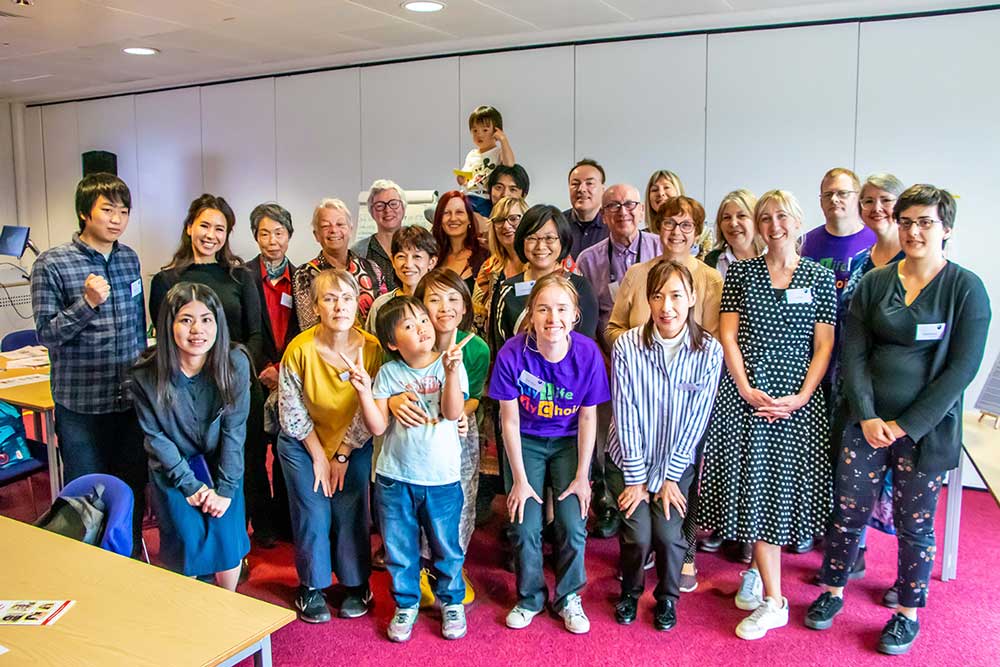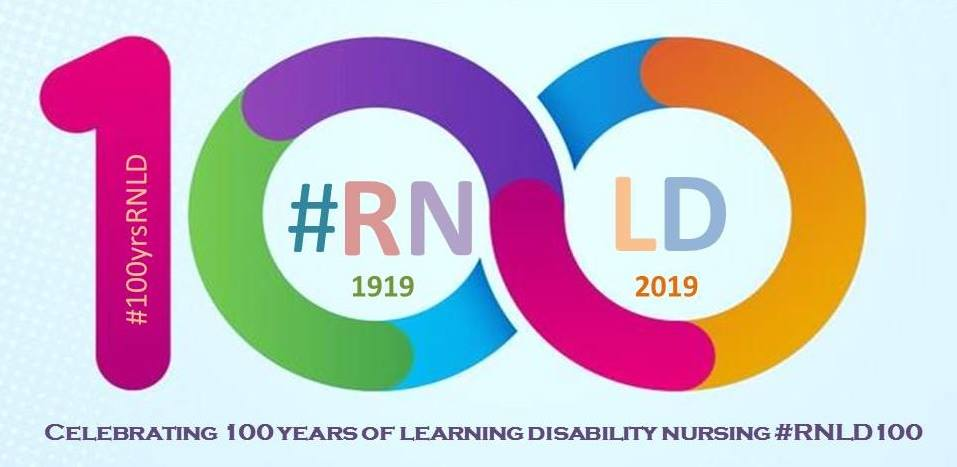You are here
- Home
- News
News
Launch of the George Padmore Institute Easy Read series
The Open University’s SHLD group has collaborated with the George Padmore Institute and Generate Voices to create Easy Read resources on Black British history. Find out more about the George Padmore Institute and Generate Voices.
New project on end of life care for people with learning disabilities begins
Members of the SHLD group at The Open University are collaborating on the DAPPLE project which runs from September 2024-August 2027. This inclusive research project will explore the care that people with learning disabilities receive at the end of their life, and how this can be improved.
Launch of resources to support end of life care planning for people with learning disabilities
Members of the OU’s SHLD group were part of the Victoria and Stuart project that ran from 2022-2024. This project produced resources and a toolkit to support end of life care planning in collaboration with people with learning disabilities, family members and support staff.
Finding Ivy: A Life Worthy of Life
This exhibition has been co-curated by SHLD members Simon Jarrett and nursing lecturer Helen Atherton of the University of Leeds. It tells the life stories of 13 British-born victims of the German Nazi state’s mass killing programme against disabled and mentally ill people which took place during the first years of the second World War. Find out more about the Finding Ivy exhibition and the research that underpins it.
Remembering Gloria Ferris
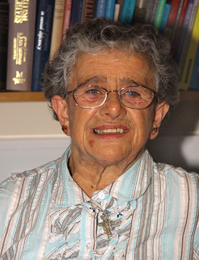 It is with great sadness that we share the passing of our long-standing OU Social History of Learning Disability member, Gloria Ferris.
It is with great sadness that we share the passing of our long-standing OU Social History of Learning Disability member, Gloria Ferris.
Gloria was a remarkable woman with a rich and inspiring life story. She was a regular attendee at our SHLD conferences over the years, always full of good humour and welcoming of new people. Gloria will be sadly missed.
Fellow SHLD member, Jane Abraham – Gloria’s long-term friend and advocate - has kindly provided the following obituary for Gloria.
Obituary: Gloria Ferris 1939 – 2024
OU funded research investigates the funding of self-advocacy
In 2021, an inclusive team of researchers from The Open University (OU) teamed up with Learning Disability England to find out more about the funding of self-advocacy. The research explored how and why some groups have managed to stay strong and survive, while others have found it difficult to secure enough money to keep going.
Learn more about the research results and recommendations.
SHLD launches Keeping in Touch events!
This year the SHLD group will run a series of FREE online Keeping in Touch events. These events will replace our annual conference that usually takes place at The Open University in Milton Keynes.
Keeping in Touch days are designed to help us keep connected during the pandemic and share exciting developments in learning disability research and practice. They are inclusive sessions (on Zoom), involving a mix of presentations and discussion.
There are four Keeping in Touch events scheduled for 2021:
Tuesday 11th May 2021, 3-4.15pm
Strength through Story
The Surviving through Story website has been collecting personal stories from learning disabled people about how they are getting through the extraordinary challenges of the COVID 19 pandemic. The site has been a place to deposit stories about everyday life.
The event will feature stories from the site selected by the Surviving Through Story advisory group and will show a short film by journalist and author Saba Salman.
This is an interactive event and there will be opportunities for participants to join in discussion and share stories.
Tuesday 13th July 2021: 9.30-11.30
Loss and Survival: remembering and staying strong
This event focuses on how people with learning disabilities face death and dying, loss and bereavement, and recovery. Our Keynote Speakers are: Irene Tuffrey-Wine, Professor of Intellectual Disability and Palliative Care at Kingston & St. George’s University, whose work on bereavement is internationally renowned, and Richard Keagan Bull, co-researcher and self-advocate. Following their talk, Sue Pigott and Talkback will share their practical toolkit for coping with loss.
There will be time for discussion with an optional extension to the meeting from 11.30-12.30 for anyone who would like to share personal experiences.
The event is aimed at adults with learning disabilities and those who support them, including families, social care workers, health workers, teachers, therapists and counsellors, advocates and friends.
Anyone experiencing loss of a loved one during this difficult time can phone the CRUSE helpline which is available on 0808 808 1677-opening times each day are on the website www.cruse.org.uk
Tuesday 21st September 2021In Response:
Making academic journals more inclusive
In 2020 The British Journal of Learning Disabilities (BJLD) launched a new feature In Response, giving people with learning disabilities the chance to provide feedback on published journal articles. In Response has highlighted important issues about who does research, how and why. It’s also raising some big questions about how people with learning disabilities can access published research and in what formats.
One year on, join us to hear In Response reviewers from Barod CIC, Sunderland People First and Cardiff People First talking about their experience of doing In Response pieces with BJLD journal editor Professor Melanie Nind.
December 2021:
This event will be focused on marking some key anniversaries in the history of learning disability policy, for example the White Papers of 1971 and 2001.
Details to be confirmed.
Invites will be sent out before each Keeping in Touch event, but if you would like to register an interest in any of the sessions, please contact Chrispina.Odunewu@open.ac.uk
OU funded research explores the impact of self-advocacy and technology on people with learning disabilities during the pandemic
Between July and September 2020, an inclusive team of researchers from the OU undertook two linked research projects exploring the role of self-advocacy and technology in supporting people with learning disabilities during the coronavirus pandemic.
Follow this link to find the results and recommendations from our research.
SHLD builds new research network between the UK and Japan
In 2019, the OU’s Social History of Learning Disability Group received UKRI ESRC funding to build a new research network between the UK and Japan. The focus of our research exchange was ‘learning disability and belonging’. You can read the full report in the following pdf document:
UK Japan report on learning disability and belonging
Celebrating 100 years of Learning Disability Nursing in the United Kingdom
To celebrate 100 years of Learning Disability Nursing in the United Kingdom we (Social History of Learning Disability (SHLD) and Learning Disability Nursing team at the Open University) are inviting people to submit pictures and memories they have of Learning Disability Nurses.
The pictures and memories could be about nurses who have supported the person or their family member, they could be pictures and memories about friends or families, or even be about themselves if they are a learning disability nurse.
The pictures and memories may include examples where the nurse has been part of the person's journey to ‘Belonging’ and overcoming their ‘not belonging’.
The 100 pictures and memories will be shown on the Social History of Learning Disability (SHLD) conference on the 16th and 17th July 2019 at The Open University, Milton Keynes - www.open.ac.uk/health-and-social-care/research/shld/ and will remain available to view via the new SHLD website.
To share your pictures and memories, please download the information letter and the consent form below
2018 Conference
The Call for Papers for our 2018 conference is now open! The theme of this year’s conference is ‘Advocacy and the social history of learning disability: Family and Self-Advocacy’. More details can be found on the Call for papers (pdf).
Please submit your accessible abstract by Monday 12th March 2018 to:
Lee Woodham
by email at
Shld-conference@open.ac.uk
or by post to
Faculty of Wellbeing, Education and Language Studies, The Open University, Milton Keynes, MK7 6AA.
Please refer to our Top tips for making abstracts and presentations more accessible (pdf).
NEW SHLD ARTICLE AVAILABLE!
'The changing face of parent advocacy: a long view' has been published by Disability and Society.
Authored by Jan Walmsley, Liz Tilley, Sue Dumbleton and Janet Bardsley, the paper reviews the history of parent advocacy in the UK on behalf of and with people with lerning disabilities, since the mid twentieth century.
Click below for more information:
tandfonline.com/doi/full/10.10…
SHLD Conference 2017 - Doing research on the social history of learning disability: learning lessons
20th and 21st July 2017, The Open University, Milton Keynes
We are delighted to announce that the next Social History of Learning Disability Conference will be held at The Open University in Milton Keynes on 20th and 21st July 2017.
The theme of the conference is 'Doing research on the social history of learning disability: Learning Lessons'
Please click here to register and find out more about the conference.
A tribute to Lord Rix: 1924–2016
by Emeritus Professor Dorothy Atkinson
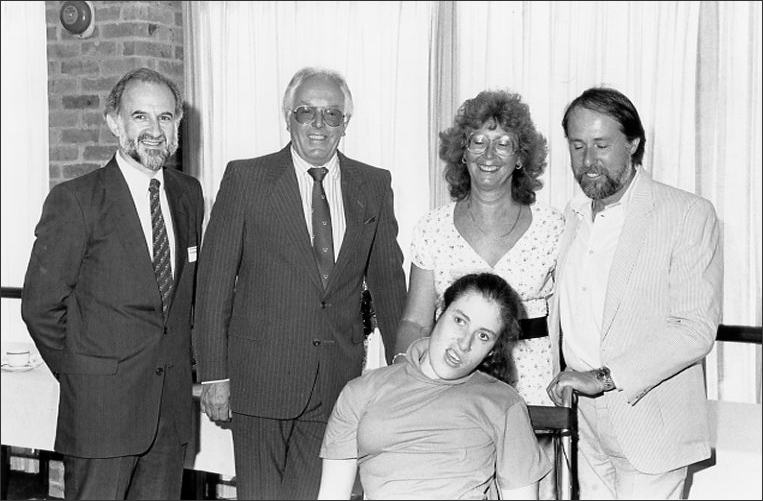
The death of Brian Rix in August 2016 brought to an end a more than 30 year association with the Open University. It was his radical idea in the early 1980s to develop an OU course which would be open to everyone involved in learning disability. The idea was to bring knowledge, skills and best practice to as wide and diverse an audience as possible, including staff, parents and volunteers, in order to improve the lives of people with learning disabilities. Brian Rix, as he was then, campaigned for funds and OU backing, resulting in the ground-breaking course Patterns for Living which was launched in 1986.
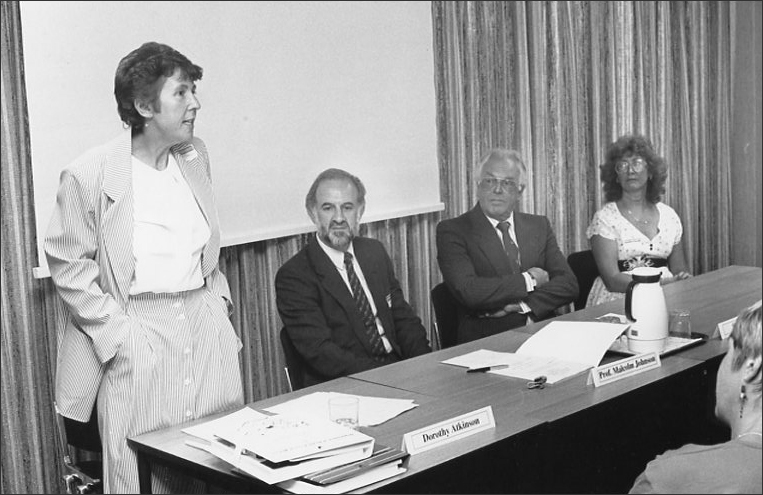
This concept of an open learning course in learning disability was both innovative and timely. Nothing like this existed at the time. At the beginning of the 1980s, many people with a learning disability were still living in long-stay institutions and community care was more an aspiration than a reality. There were examples, here and there, of good services and ‘best practice’ but no effective means of sharing them. What was needed was a means of disseminating the best of the best practices so that everyone could adopt them; but what was even more important was the need to change hearts and minds so that everyone could see the need to do things differently. This was what the first OU course in learning disability, financed and produced in partnership with Mencap, set out to do - to bring about change at all levels: changes in the attitudes, approaches and skills of the workforce, but also real changes in provision and the quality of people’s lives.
Conceived as an idea in 1982 by Brian Rix, then Secretary-General of Mencap, and supported by Chris Pym from the OU, funding of the proposed course took a further two years, with production starting in 1984. The course Patterns for Living was launched to great acclaim in 1986 - as well as members of the course team, Brian Rix (Mencap) and Lady Trumpington (Department of Health) spoke at the launch of the course’s importance. The new course pioneered the use of real-life case studies, people’s stories and authentic voices (on audio cassettes and on television, as well as in the course workbooks) as a way of engaging students’ interest in the issues, but also as a means of enabling them to learn, to understand and ultimately to think differently about people with a learning disability.
The course more than justified Brian Rix’s time and effort in championing it and raising the initial funds. It was taken up on an unprecedented scale in health, social care and educational settings to such an extent that a reprint of course materials was needed only six months after the launch. A later independent evaluation of the course (by the Health Education Authority) estimated that 16,000 students had successfully studied and completed it in its first two years. The students were drawn from all sectors - parents and volunteers as well as staff and practitioners.
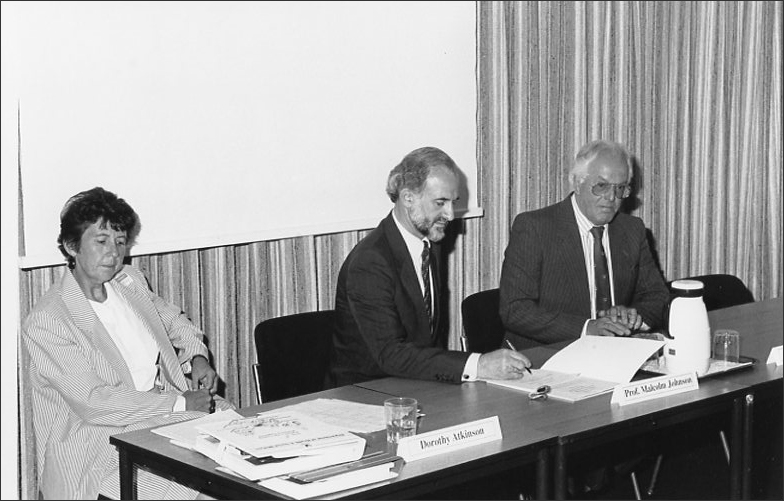
Undoubtedly Patterns for Living was a great success. However, although it put people with a learning disability at the centre of its course materials, the one audience it did not reach (with some notable exceptions) were those very same people. As a result, a new OU course was developed called Working Together, which was launched in 1988. This was the first OU (and as far as we know the first in the world) course for people with learning disabilities. Again supported by Brian Rix and Mencap, the course pioneered the use of audio drama, illustrated workbooks and accessible assessment for people with learning disabilities, many of whom later ‘graduated’ at local award ceremonies, where they received their signed and personalised certificates from local dignitaries, to family – as well as local press and radio – acclaim.
The original two courses were followed by other OU-Mencap sponsored and supported courses, forming a lasting part of Brian Rix’s legacy. In 1990, Changing Perspectives, an undergraduate-level course was launched and in 1996, exactly ten years after the original OU course, Equal People was launched. Uniquely, this later course aimed to engage everyone in the learning disability field in working and learning together as equal partners. This included the whole spectrum of students, ranging from people with learning disabilities, their families and friends to care staff, volunteers and practitioners.
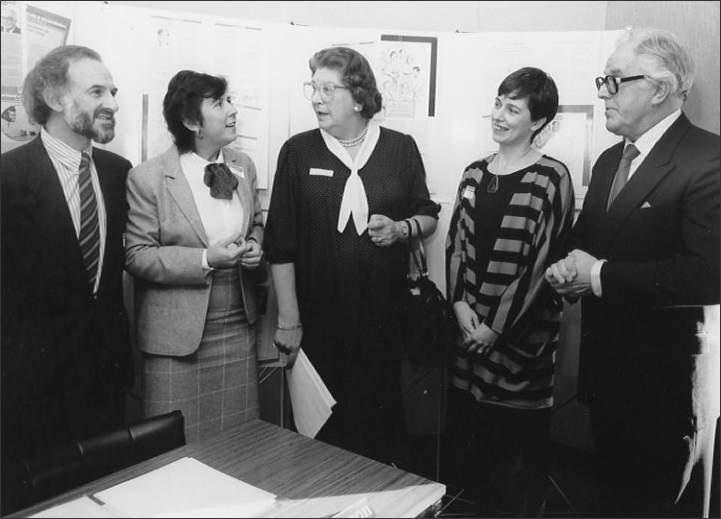
The stories of people’s lives, which over the years, have informed and inspired students from all walks of life, also became one of the founding principles of the Social History of Learning Disability research group – to make sure people’s stories are heard in the wider world. Some of these stories have appeared in the group’s series of books: Forgotten Lives (1997), Crossing Boundaries (2000), Good Times, Bad Times (2000), and a collection of family stories over 70 years of the 20th century appeared in Witnesses to Change, a book endorsed personally by Brian Rix. Work on a living archive of people’s stories is underway in a three-way collaboration between the OU, the Rix Centre (University of East London) and the University of Leeds. In so many ways, the pioneering approach of Brian Rix, more recently Lord Rix, has in partnership with the OU, helped change the world of learning disability for the better. This is a lasting tribute to his memory and one of which he would be rightly proud.
Video Tribute to Lord Rix made with his colleagues with learning disabilities
The RIX Research and Media team at The University of East London, who work regularly with the Social History of Learning Disability Research Group, have produced this short video that features the voices of the people with learning disability with whom Lord Rix has worked over the years. They appear on camera to celebrate his life and achievements and share their experiences of working with Brian as his colleagues.
Contraceptive choices for women with learning disabilities - Final Report
Contraceptive choices for women with learning disabilities is an Open University research project, supported by a grant from Open Society Foundations (Grant No: OR2014-12989). This inclusive project set out to explore women’s contraceptive decision-making and sought to include women with mild to moderate learning disabilities as well as women with high support needs. You can read the Final Report on our SHLD Reports page.
No Longer Shut Up
On 20th November 2015, the film of Mabel Cooper's life premiered at the Barbican. The film can be accessed on YouTube. Please read our Blog for more information.
The Welfare Reform and Work Bill: SHLD members attend All Party Parliamentary Group
On the 5th November 2015, Sue Ledger and Jan Walmsley from the SHLD Research Group attended a combined meeting of the All Party Parliamentary Group (APPG) on Learning Disability (chaired by Chris Heaton Harris) and the APPG on Disability (chaired by Lisa Cameron). The meeting was held to discuss changes outlined in the Welfare Reform and Work Bill. More information, including the reports from the day, can be viewed on the SHLD reports page.
An appeal for help
Rachel Allan is a student clinical psychologist at Plymouth University and is carrying out some inclusive research into the experiences of researchers who have learning disabilities. She would like to speak to people who have been involved in research (as a co-researcher) and have learning disabilities / difficulties. Rachel and her co-researchers are based in Cornwall but can travel to participants, especially if a small group of people may be interested in taking part. They have developed some easy read consent forms and information sheets for participants which they can forward on to anyone who is interested in taking part in a short interview about their experiences. Rachel is happy for anyone who is interested to contact her – rachel.allen@plymouth.ac.uk
2015 Conference
We are delighted to announce that the next SHLD conference will be held at The Open University, Milton Keynes, on 18th and 19th June 2015. The theme of the conference will be Biography, life stories and life histories. Visit the 2015 conference page for more information.
2014 Conference
Our 2014 Conference 'Exploring positive practice in learning disability: past and present' was held at The Open University, Milton Keynes, on 14th and 15th July 2014. Visit the 2014 conference page to read the abstracts, listen to the audio presentations and look at the PDF presentations from delegates on the day.
Research Group recognised by the Department of Health
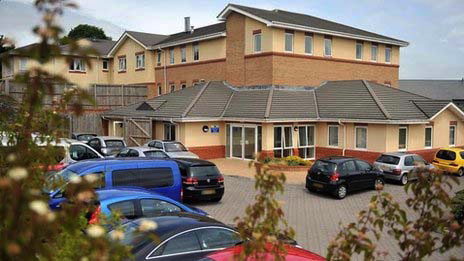
In November 2012 the Research Group submitted three examples of good practice to the Department of Health (DH) consultation 'What does good look like?', set up following the Serious Case Review into the abuse of patients with learning difficulties at the Winterbourne View hospital. These have now been selected for inclusion in the Good Practice Project. This provides a powerful endorsement of the Research Group's work and its influence on policy and practice. The Department of Health report was circulated as part of the Joint Improvement Programme. There was also a Department of Health national event in Autumn 2013 to show-case the six final good practice projects. At this event, the Open University's research group presented with people with learning disabilities who were part of the work.
Participatory research seminars
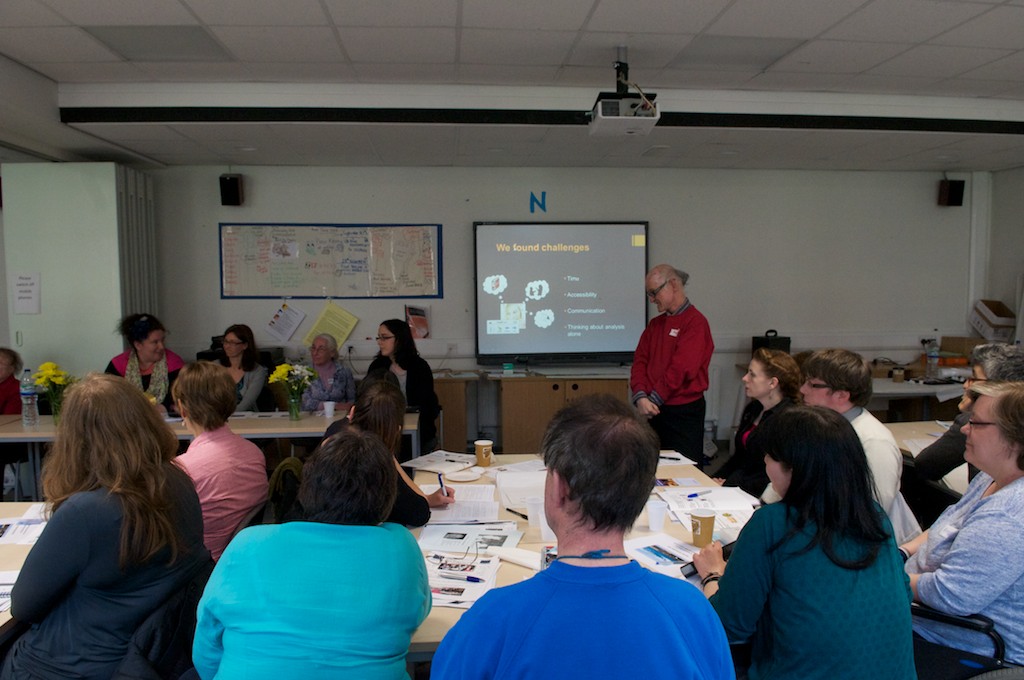
Liz Tilley, Rohhss Chapman and Melanie Nind, three members of the SHLD Research Group, joined Jane Searle from the University of Exeter to convene an Economic and Social Research Council funded seminar series. Its focus was on participatory research with people with learning disabilities and in particular the challenges related to two complex, but relatively under-explored issues, in participatory research:
- involving people with learning disabilities in data analysis, and
- involving people with learning disabilities who have high support needs in participatory reserach.
The first seminar in Plymouth in January 2013 enabled us, with the speakers and participants, to scope the boundaries of developments to date. The second seminar in Manchester in April 2013 was strongly influenced by the people with learning disabilities involved in academic work there and explored developments in participatory data analysis. Speakers have included academics, early career researchers and researchers with learning disabilities from the UK and Europe. The third seminar took place at the University of Southampton in November 2013 and the last one in the series at The Open University in April 2014. The focus of these two final seminars was on the challenge of including people with greater impairment or need for support, and also the common ground shared with inclusive researchers in other fields such as childhood studies and ageing. For further information, please contact Melanie Nind or Rohhss Chapman.
2013 Conference
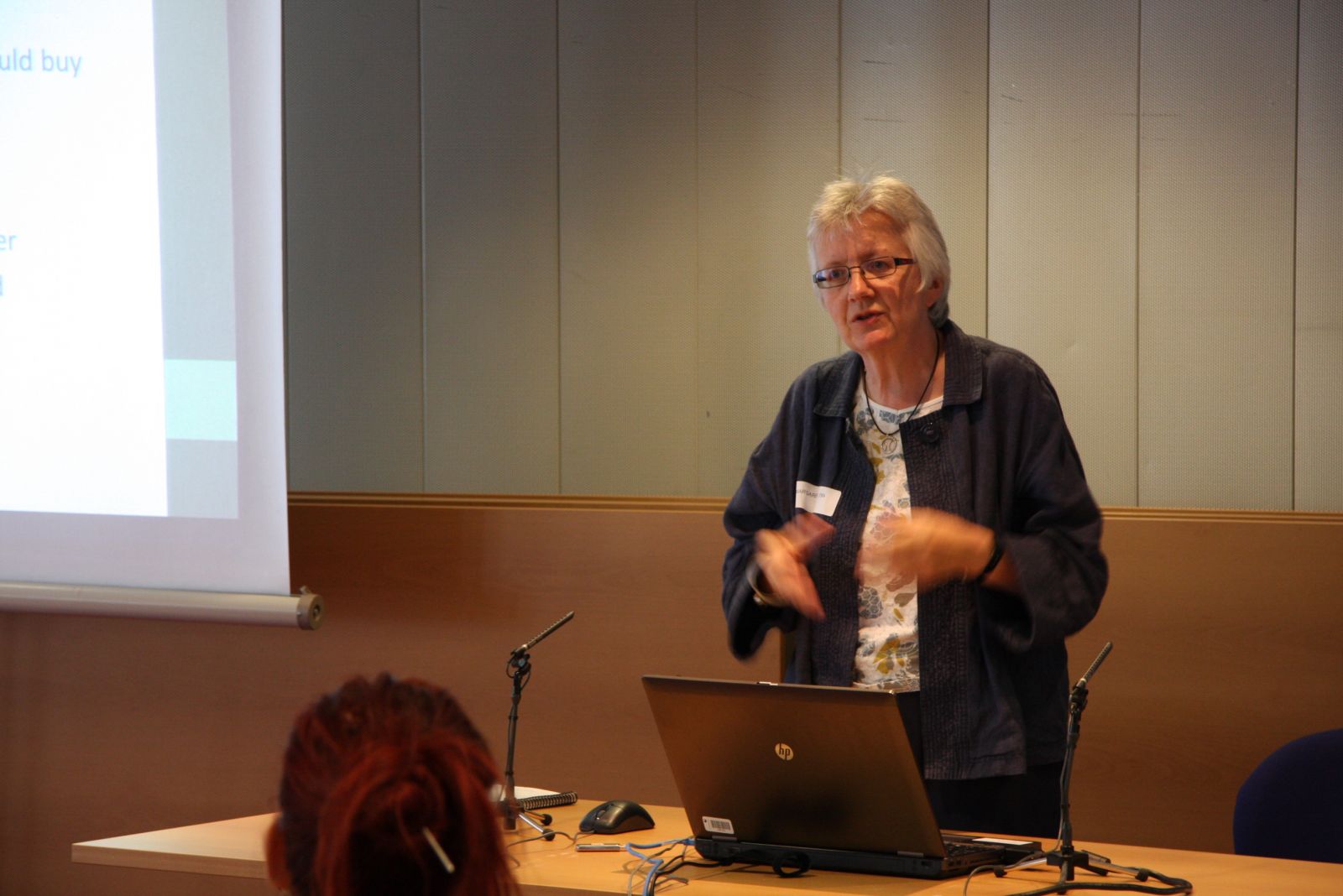
Our 2013 Conference 'Avoiding more Winterbourne Views' was held at The Open University, Milton Keynes, on July 8th. We had upwards of 100 delegates and a rich array of speakers, including our keynote speaker, Margaret Flynn, author of the Serious Case Review into Winterbourne View. People with learning difficulties, academics, practitioners and family carers came from all over the UK, as well as Ireland, Scandinavia and New Zealand.
A sad farewell to Mabel Cooper (1944-2013)
Mabel Cooper, a long standing member of the Social History of Learning Disability Research Group and friend of The Open University, died on 22 March 2013. Mabel's life story became famous around the world after it appeared, to great acclaim, in the Research Group's book Forgotten lives (1997). She was a remarkable woman, inspirational and charismatic, but also generous and warm-hearted. She will be greatly missed by all her friends and colleagues. Read Mabel's obituary (PDF).
Contact us
About the Group
If you woud like to get in touch with the Social History of Learning Disability (SHLD) Research Group, please contact:
Liz Tilley
Chair of the Social History of Learning Disability (SHLD) Research Group
School of Health, Wellbeing and Social Care
Faculty of Wellbeing, Education and Language Studies
The Open University
Walton Hall
Milton Keynes
MK7 6AA
About the website
If you have any feedback or would like to report a problem with the website, please contact WELS-Research-Admin@open.ac.uk.
